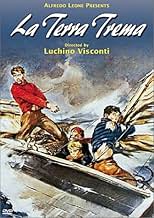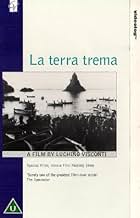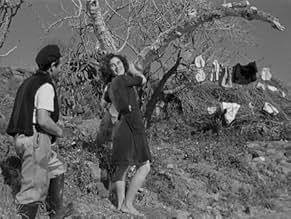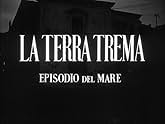NOTE IMDb
7,8/10
6 k
MA NOTE
Dans la Sicile rurale, les pêcheurs sont à la merci de cupides grossistes. Une famille risque tout pour acheter son propre bateau et travailler de manière indépendante.Dans la Sicile rurale, les pêcheurs sont à la merci de cupides grossistes. Une famille risque tout pour acheter son propre bateau et travailler de manière indépendante.Dans la Sicile rurale, les pêcheurs sont à la merci de cupides grossistes. Une famille risque tout pour acheter son propre bateau et travailler de manière indépendante.
- Réalisation
- Scénario
- Casting principal
- Récompenses
- 1 victoire et 1 nomination au total
Luchino Visconti
- Narrator
- (voix)
- (non crédité)
Antonio Pietrangeli
- Narrator
- (voix)
- (non crédité)
Antonio Arcidiacono
- Ntoni
- (non crédité)
Giuseppe Arcidiacono
- Cola
- (non crédité)
Venera Bonaccorso
- La vecchia che ride
- (non crédité)
Nicola Castorino
- Nicola
- (non crédité)
Rosa Catalano
- Rosa
- (non crédité)
Rosa Costanzo
- Nedda
- (non crédité)
Alfio Fichera
- Michele
- (non crédité)
Carmela Fichera
- La baronessa
- (non crédité)
Agnese Giammona
- Lucia
- (non crédité)
Nelluccia Giammona
- Mara
- (non crédité)
Ignazio Maccarone
- Maccarone
- (non crédité)
Giovanni Maiorana
- Un bambino
- (non crédité)
Antonino Micale
- Vanni
- (non crédité)
Maria Micale
- La madre
- (non crédité)
Avis à la une
Although it was supposed to be a documentary, Visconti put in a slight story line to achieve what a documentary would have done, AND MORE. --He used no professional actors, just native Sicilian fishermen, and other villagers, to play all parts. -- The film uses no artificial lighting, no sound enhancement, sound-effects, or dubbing. -- It was filmed on location in, and around, the crumbling homes of the poor villagers, and it was recorded in the Sicilian dialect (rather than proper Italian), and although it has a documentary "look", Visconti shows the exploitation of the poor by the capitalist middlemen so much more effectively than any documentary could have done.
-- Also, while not the first neo-realist film of that post-war Italian genre, this was the first film to be described by the term: "neo-realist". --A brilliant film on all counts. I rated it "10".
-- Also, while not the first neo-realist film of that post-war Italian genre, this was the first film to be described by the term: "neo-realist". --A brilliant film on all counts. I rated it "10".
This moving slice of life has several acts and moves like an opera, but the scenes are "neo-realistic" in the best sense.
All of Visconti's actors are from the Sicilian fishing village, but they were not acting--just portraying their lives. You care about these real people!
Family is everything--and it survives despite the buffeting by the storms, the stranglehold of the oligarchical wholesalers, and shortsightedness of the townspeople. We see the exploitation of the fishermen vividly and how most accept it as "God's will."
It also brings to mind the old joke: What is the difference between capitalism and communism? Capitalism is the exploitation of man by man, and communism is just the reverse.
All of Visconti's actors are from the Sicilian fishing village, but they were not acting--just portraying their lives. You care about these real people!
Family is everything--and it survives despite the buffeting by the storms, the stranglehold of the oligarchical wholesalers, and shortsightedness of the townspeople. We see the exploitation of the fishermen vividly and how most accept it as "God's will."
It also brings to mind the old joke: What is the difference between capitalism and communism? Capitalism is the exploitation of man by man, and communism is just the reverse.
1. This movie is likely to excruciate those who are not used to reading fast, because the images are too great to be sacrificed for subtitles. Even most of the Italian-speaking people have a hard time understanding this Sicilian accent.
2. The other reason why La terra trema is found boring by many is that reality matters much more than drama to the neorealist director Luchino Visconti. So the audience shouldn't be passive while seeing some real lives going on, that is the only way to feel engaged.
3. The most notable advantage of the movie comes to attention right here. It is touching without bending over backwards for that purpose. You can feel connected to it and at the same time wonder where all that connection comes from. (The movie does not try hard to make you feel this way) It shakes your deepest emotions simply because all it has to do with is the reality of a human society, and also with the real nature for that matter.
4.Another important point here is Visconti doesn't let the fact that he believes in Socialism affect the reality of what he is portraying. The hammer and sickle on the wall in no way seems anything other than part of a neutral report. He reminds us of those journalists who succeed in providing us with an unbiased report regarding a massively resented dictator when we are pretty sure the journalist hates the dictator as much as we do.
5. All in all this is a great picture , of course it requires active audience who know what they want to get from the almost sheer reality pictured.
2. The other reason why La terra trema is found boring by many is that reality matters much more than drama to the neorealist director Luchino Visconti. So the audience shouldn't be passive while seeing some real lives going on, that is the only way to feel engaged.
3. The most notable advantage of the movie comes to attention right here. It is touching without bending over backwards for that purpose. You can feel connected to it and at the same time wonder where all that connection comes from. (The movie does not try hard to make you feel this way) It shakes your deepest emotions simply because all it has to do with is the reality of a human society, and also with the real nature for that matter.
4.Another important point here is Visconti doesn't let the fact that he believes in Socialism affect the reality of what he is portraying. The hammer and sickle on the wall in no way seems anything other than part of a neutral report. He reminds us of those journalists who succeed in providing us with an unbiased report regarding a massively resented dictator when we are pretty sure the journalist hates the dictator as much as we do.
5. All in all this is a great picture , of course it requires active audience who know what they want to get from the almost sheer reality pictured.
Luchino Visconti's epic on a family living in the Sicilian fishing village of Trezza, the Valastros, is a compelling story, told with sincerity and skill, and for the outsider viewing into their world it's at the least interesting and at its most heart-felt is rather affecting. Narrators Visconti and Antonio Pietrangeli themselves are outsiders to the world of dirt-poor fishermen who work their entire lives to earn pittance for the wealthy wholesalers (it's based on a novel, I Malavoglia- translated as Ill Will- by Giovanni Verga).
Their narration can hint the audience member on little details that wouldn't be known from the characters, however sometimes their voice-over, in such a documentary style (before this Visconti was among a group of directors for a documentary during world war 2 that is not listed on this site but it mentioned in the documentary My Voyage to Italy) can be a little deterring as they mention certain emotions the characters are feeling that we as the audience can determine right in the eyes.
The story tells of the Valastros, in particular 'Ntoni, an idealist who returns from fighting in the war with a much different view of the environment around him than what his elders would want to believe. Unlike his grandfather, who has worked for the wholesalers and not earned and saved a cent more or less than his children, he wants change in the way things are done, and soon gets enough money to build his own boat and to sell his own fish.
Things look optimistic, until nature intervenes in destroying the boat, leaving 'Ntoni without a job, the wholesalers laughing at him mercilessly and little by little loosing any respect he had in the village. His other family members also get time on the screen- two sisters who want to meet a man to marry, and how one is at the will of God and the other is at the will of the Don of the village, Don Salvatore; also a brother, who after losing his job becomes a smuggler bringing in cigarettes. Their stories, in a pacing that may have some wondering when it will end and some wondering if it can go on longer, lead up to a heartbreaking climax for each of them.
I learned shortly after viewing La Terra Trema that Luchino Visconti (I suppose it shouldn't have been much of a surprise considering the state Italy was in before, during, and after the war) was a lifelong member of the Communist party despite being raised in a wealthy environment in Northern Italy. While I had a feeling there was something about the way Visconti depicted the Volostros and the nature of the people and the village that seemed "for the working man", but I didn't really feel that the political intonations were a crutch to the overall execution of the film. Since one of the pin-points of neo-realism is to tell things as simply as they unfold in real life, no matter how downtrodden it can get, the focus of the fishermen versus the wholesalers is made more as a reflection of basic good versus evil, and it can appeal to those who don't want a strict tale of classes.
Its humanity is what shines through, and that is what should appeal to connoisseurs of neo-realism and Italian filmmaking; while I can't quite recommend it as much as The Bicycle Thief or Open City, I can recommend it as the first film people should see if they want to know and understand the work of Visconti, his operatic intonations with his players a graceful counterpart to his documentary techniques.
Their narration can hint the audience member on little details that wouldn't be known from the characters, however sometimes their voice-over, in such a documentary style (before this Visconti was among a group of directors for a documentary during world war 2 that is not listed on this site but it mentioned in the documentary My Voyage to Italy) can be a little deterring as they mention certain emotions the characters are feeling that we as the audience can determine right in the eyes.
The story tells of the Valastros, in particular 'Ntoni, an idealist who returns from fighting in the war with a much different view of the environment around him than what his elders would want to believe. Unlike his grandfather, who has worked for the wholesalers and not earned and saved a cent more or less than his children, he wants change in the way things are done, and soon gets enough money to build his own boat and to sell his own fish.
Things look optimistic, until nature intervenes in destroying the boat, leaving 'Ntoni without a job, the wholesalers laughing at him mercilessly and little by little loosing any respect he had in the village. His other family members also get time on the screen- two sisters who want to meet a man to marry, and how one is at the will of God and the other is at the will of the Don of the village, Don Salvatore; also a brother, who after losing his job becomes a smuggler bringing in cigarettes. Their stories, in a pacing that may have some wondering when it will end and some wondering if it can go on longer, lead up to a heartbreaking climax for each of them.
I learned shortly after viewing La Terra Trema that Luchino Visconti (I suppose it shouldn't have been much of a surprise considering the state Italy was in before, during, and after the war) was a lifelong member of the Communist party despite being raised in a wealthy environment in Northern Italy. While I had a feeling there was something about the way Visconti depicted the Volostros and the nature of the people and the village that seemed "for the working man", but I didn't really feel that the political intonations were a crutch to the overall execution of the film. Since one of the pin-points of neo-realism is to tell things as simply as they unfold in real life, no matter how downtrodden it can get, the focus of the fishermen versus the wholesalers is made more as a reflection of basic good versus evil, and it can appeal to those who don't want a strict tale of classes.
Its humanity is what shines through, and that is what should appeal to connoisseurs of neo-realism and Italian filmmaking; while I can't quite recommend it as much as The Bicycle Thief or Open City, I can recommend it as the first film people should see if they want to know and understand the work of Visconti, his operatic intonations with his players a graceful counterpart to his documentary techniques.
In 1947, in Sicily near Catania, the fishermen in Aci Trezza have been exploited by generations by the local middlemen. The young 'Ntoni Valastro rebels against the economical situation of his poor family and convinces the Valastro to mortgage their simple house in the Fidania Bank in Catania to buy a fish boat of their own and never work again for the wholesalers. In a stormy day, he decides to fish due to the necessity of repaying the debt to the bank; however, the storm destroys his boat and the dream of his family. Without any support and job, 'Ntoni sees the disintegration of his outcast family.
"La Terra Trema: Episodio del Mare" is a heartbreaking, bitter and cruel story of a family of fishermen that decides to change their poor economical situation facing the powerful exploiters. The Marxist "Red Count" Luchino Visconti directs and narrates this little masterpiece of the Italian Neo-Realism casting non-professional actors and actresses, actually fishermen and inhabitants of Aci Trezza. The abusive treatment of the greedy and idle wholesalers gives an idea of how workers were exploited in this period of history and the reason for the ideological fight of classes between Communism and Capitalism. In Brazil, this film was released on DVD by Versátil Distributor. My vote is nine.
Title (Brazil): "A Terra Treme" ("The Earth Shakes")
"La Terra Trema: Episodio del Mare" is a heartbreaking, bitter and cruel story of a family of fishermen that decides to change their poor economical situation facing the powerful exploiters. The Marxist "Red Count" Luchino Visconti directs and narrates this little masterpiece of the Italian Neo-Realism casting non-professional actors and actresses, actually fishermen and inhabitants of Aci Trezza. The abusive treatment of the greedy and idle wholesalers gives an idea of how workers were exploited in this period of history and the reason for the ideological fight of classes between Communism and Capitalism. In Brazil, this film was released on DVD by Versátil Distributor. My vote is nine.
Title (Brazil): "A Terra Treme" ("The Earth Shakes")
Le saviez-vous
- AnecdotesThe cast was exclusively composed of non-professional actors. They were genuine fishermen and inhabitants of Aci Trezza (Sicily). The credits do not name any of the actors, who are collectively listed as "Pescatori Siciliani" (Sicilian Fishermen).
- Citations
Title Card: [in Italian] In Sicily, Italian is not the language of the poor.
- Versions alternativesWas originally released without Italian narration, but it flopped because the Italian audience could not understand the Sicilian dialect. Visconti re-released it with his own narration, which many find detracts from the film.
- ConnexionsEdited into Bellissimo: Immagini del cinema italiano (1985)
Meilleurs choix
Connectez-vous pour évaluer et suivre la liste de favoris afin de recevoir des recommandations personnalisées
- How long is La Terra Trema?Alimenté par Alexa
Détails
- Durée
- 2h 32min(152 min)
- Couleur
- Rapport de forme
- 1.37 : 1
Contribuer à cette page
Suggérer une modification ou ajouter du contenu manquant






















